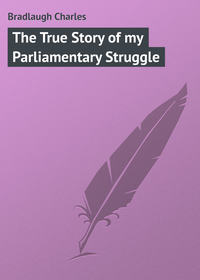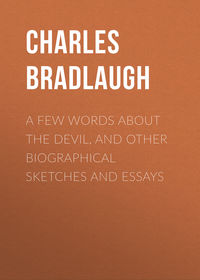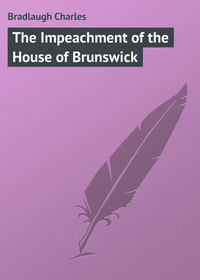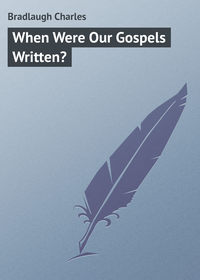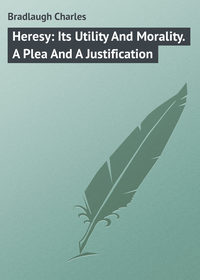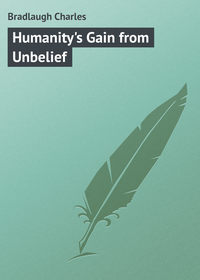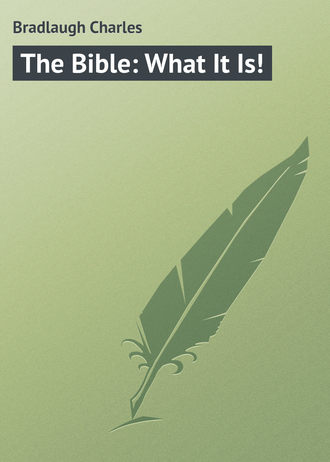 полная версия
полная версияThe Bible: What It Is!
It ought not to be used as an educational book amongst the children of men, because it contains doctrines and precepts only fitted for the offspring of tyrants and slaves. It teaches that children may be born slaves, and that their parents may sell them as slaves, and it places money at a higher value than life, virtue, honour, or liberty.
BOOK III. LEVITICUS
In dealing with the laws of the Jews, I feel compelled to avoid very many texts on account of their disgusting nature; but generally I may remark that it is evident the Jews must have been an ignorant, viciously-inclined, unintellectual, and thoroughly-depraved people, or such laws would never have been required. If God chose the best people on the earth, the state of the whole of the human family must have been very bad indeed. My reason for avoiding the above-mentioned class of texts is twofold; first, although I think them fair matter for comment, I have no wish to offend or insult any reader who, from his or her mode of education, has been taught to regard such subjects as unfit for discussion; second, I am not quite certain that the 'Society for Suppression of Vice,' or some kindred society, may not be induced to again attack works of this class, in which case I have no wish to afford the counsel for the prosecution an opportunity of declaiming against my obscene style, but wish, if possible, to compel my most severe critics to admit that I have been more choice in my phraseology than the writers of the Book they defend.
Chapter, v. 3. The Douay reads – 'If his offering be a holocaust, and of the herd, he shall offer a male without blemish at the door of the testimony to make the Lord favourable to him.' It will be perceived that the words italicised are not contained in, our version at all. The holocaust, or whole burnt offering, is so called because the whole victim was consumed with fire, and ascended, as we are told in verse 9, 'with a sweet savour to the Lord.' What elevated conceptions of the Deity are here conveyed; an infinite God, whose favour is granted to the man who burns the most sheep or oxen; a just and immutable God, to whom the sweet savour of roast mutton is an acceptable expiatory equivalent on behalf of a murderer, a robber, or other criminal.
Chapter ii., vv. 3 and 10. The priests are not neglected in this revelation.
Verse 13. Without salt the sacrifice would be incomplete. Query. Was not the salt rather required by the priests than by God? It is easy to understand why a man wishes for salt to season his meat, but it is not so easy to comprehend the same requisition on the part of a God.
Chapter vi., v. 13. This fire must have been out several times, especially since the last conquest of Jerusalem. Where is it burning at the present time? By reference to chap, ix., v. 24, and chap, x., vv. 1 and 2, it would seem that this fire came from God himself.
Chapter vii., vv. 23 to 27. Those are cruel and useless laws. The punishment of death is strangely disproportioned to the offence; and unless the law has become obsolete, we must wonder that God allows the manufacturers and consumers of articles of food, made from the blood and fat of animals, to escape unpunished in the present day.
Chapter xi. It is difficult to conceive the reason why, in the list of articles fit for food, eels should be forbidden as having no scales, and classed as unclean with hares and swans, while locusts, grasshoppers, and beetles are permitted. The Douay gives entirely different names to some of the prohibited animals, mentioning, amongst others, the griffin, an animal whose existence is much doubted. No naturalist has ever yet described it to us, it is only mentioned in a few old fables.
Chapter xvi., vv. 21 and 22. 'And Aaron shall lay both his hands upon the head of the live goat, and confess over him all the iniquities of the children of Israel, and all their transgressions in all their sins, putting them upon the head of the goat, and shall send him away, by the hand of a fit man, into the wilderness: and the goat shall bear upon him all their iniquities into a land not inherited, and he shall let go the goat into the wilderness.' Is not this supremely ridiculous? and the absurdity is only heightened by the inutility, for I do not find that the Israelites were ever let off from any punishment by reason of the scapegoat. The doctrine of the scapegoat has gained considerably of late; and it is the custom when an outcry is raised against the actors in any public grievance, to offer up some person (who generally is innocent of all participation in the offence) as a scapegoat.
'The Egyptians had a similar custom, as we learn from Herodotus, Book 2, chap. 39, who relates it in these words: —
'"After they have killed the goat, they cut off its head, but they flay the animal's body, after which, having pronounced many imprecations on the head, those who have a market and Grecian merchants dwelling among them, carry it thither and sell it to them; but those who have no Grecian residents to sell it to, throw the head into the fire, pronouncing over it the following imprecations: – 'If any evil is about to befall either those that now sacrifice, or Egypt in general, may it be averted on this head!'" 'The two customs, though not perfectly the same, are so far similar that the one appears to have been derived from the other. The import of both is certainly the same; for in both the goat is made use of as a substitute to draw away calamity from the party sacrificing; in the one case being sent into the wilderness, and in the other consumed by fire.'
Chapter xvii., vv. 3 and 4. The absurdity of this command will be apparent upon the slightest examination. If the Jews were as numerous as is represented when in Egypt, and continued to increase and multiply in the same ratio, they would have filled a very large portion of the earth's surface; but even allowing for biblical exaggeration, it would have been impossible for a people, amounting to several hundreds of thousands, to have all slaughtered their cattle at one spot (the door of the Tabernacle); and if they had done so, judging from the appearance and odour of modern slaughterhouses, I can scarcely think that the 'holiest of holies' would have been at the same time 'the sweetest of sweets.' It would have been still more impossible for each individual to have brought (perhaps from a distance of several miles) each an ox, lamb, or goat killed. It is not at all probable, in a nation so ignorant as the Jews, that the people possessed carts and waggons for the purpose of transporting the dead cattle to and fro, and if they had, the waste of labour would have been enormous. The severe penalty of death is all that is required to make this essentially one of 'God's laws.' What would be said if all the slaughtered cattle in England were, by Act of Parliament, compelled, under penalty of death, to be brought to the door of St. Paul's Cathedral to have the fat and blood taken from them?
Verse 7, chap, xix., w. 26 and 31, chap, xx., vv. 6 and 27. What are devils? If God is the Creator of all things, did he create devils? If so, it is scarcely just to punish us for falling victims to devils, whom God must have made sufficiently powerful to tempt us to the commission of crime. If otherwise, are devils independent existences, because in that case the Deity is not omnipotent. They are neither; devils, angels, gods, familiar spirits and demons, all stand in the same mythological position. They belong to the past, not to the present. They belong to the age of ignorance, not of inquiry. We find in such verses as these the clue to the superstitious fear with which the inhabitants of some little villages still regard certain old men and women; we find in them also the clue to the persecutions for witchcraft in the reign of King James, etc. Strong objections have been urged against the doctrine of devils, demons, and familiar spirits. It is said by Theists that it is contrary to all natural conceptions of the benevolence and mercy of the Deity; that he should have created, and should sustain in existence, beings of the highest intellectual order to be the subjects of eternal misery, not only to themselves, but to all humanity. It is further urged that the doctrine detracts from the power of God by holding forth an almost omnipotent chief of a legion of powerful and mischievous devils, all bent on the destruction of mankind. It is further, and very reasonably, urged that the Jews, especially alter their connection with the Chaldean and Persian nations, had imbibed very extended, and, at the same time, very puerile ideas with regard to the operations of both good and bad spirits. The properties of plants, of mineral waters, of minerals, of certain climatic conditions, the existence of any remarkable phenomena, the insanity of men, or animals, were all attributed to the presence and influence of good and bad spirits. Sound science has exploded these errors; and why should not the whole mass of demonology be rejected as exploded also (vide Farmer on the 'Demoniacs,' and Pye Smith's 'Christian Theology')?
Chapter xxvi. It is worthy of notice that in this chapter, which professes to describe the reward for obedience to God's laws, and the punishment for disobedience, no reference whatever is made to a future state. The rewards are temporal – viz., good harvests, and easy victory over enemies, etc. The punishments are also temporal – viz., painful defeat in battle, sterile land, captivity, starvation, etc Not a word about the soul, or about heaven, or hell; yet a chapter like this seems a place in which, if such a doctrine had been held by the writer, we should expect to find some traces of it; temporal punishment of a very severe kind is threatened, but nothing occurs wnich can in any way lead us to a spiritual punishment; death seems to be the highest penalty, and the author of the Pentateuch did not contemplate the possibility of tormenting men after they were dead – this was reserved for more enlightened ages.
Chapter xxvii., vv. 28 and 29, has been noticed on page 54.
Verses 30 to 33. The clergy are very zealous in conserving their claims under these verses (which of course apply to the whole world). They act as the Lord's representatives, and take the Lord's share to themselves.
The Book of Leviticus only claims our attention under two phases – first, as a revelation from God: and second, as a code of laws. It cannot be a revelation from an immutable God, because it alleges that God is influenced in his conduct by particular kinds of sacrifice: it cannot be a revelation from an all-wise and just God, because it contains trifling and absurd commands enforced by severe penalties; it cannot be a revelation from an all-powerful and infinitely good Creator, because it treats of devils and bad spirits, either having independent or permitted power to commit evil. As a code of laws, it is utterly inapplicable to the present state of society; and, in fact, seems mainly intended to support and benefit the priests (placing the government in their hands), but is utterly without utility as regards the people, the punishments are mostly very disproportionate, and for breaches of the ceremonial law unnecessarily severe.
BOOK IV. NUMBERS
Chapter i., v. 14, chap, ii., v. 14. In one we find Eliasaph the son of Reul, in the other Eliasaph the son of Deuel. In chap. vii., vv. 42 and 47, and in chap, x., v. 20, it is also Eliasaph son of Deuel. Which is right?
Verse 46. By this verse we learn that the number of Jews, warriors (not including the Levites), capable of bearing arms, was 603,550; and taking old and young into consideration, you can hardly compute these at more than three out of each ten, which would leave a total of about 2,000,000 males, the proportion of females would be upwards of 2,000,000 more; these, together with male and female slaves, and the tribe of Levi, must have made upwards of 5,000,000 people. This would be an immense number to pass through a desert, where water and food were deficient.
Verse 49, see chap, iii., v. 15. The Lord must have changed his original intention.
Chapter iii., v. 39. 22,000 is incorrect, it should be 22,300 – viz., Gershonites 7,500, Kohathites 8,600, Meranites 6,200. This may seem a trifling error, but in a revelation from God we are not prepared to expect errors at all; and in this case it is a grave error, and not a mere slip of the copyist, or transcriber, for in verse 46 we are told that the first-born were 273 more in number than the male Levites, when in feet they were twenty-seven less. It is very extraordinary that the Levites should be comparatively so few in number, especially when we consider them as the most favoured by God. The whole of the Levites, male and female, could not be much over 50,000, while the other tribes averaged 350,000 each.
Chapter iv., v. 20. The same mystery as before observed, coupled with the usual threat of death to deter the uninitiated from too closely examining the things of God.
Verse 23. By this the Levites are to serve from thirty to fifty; in chap, viii., v. 24, it is from twenty-five to fifty.
Chapter v., w. 8, 9, and 10. Here is a complete identification of the rights of the Lord with those of the priest, 'Let the trespass be recompensed unto the Lord, even unto the priest.' Whether this Book be a revelation from God or not, it is quite clear that it is the interest of the priesthood to support it.
Verses 17 to 27. We have read of various ordeals amongst savage nations, and it is customary to deplore the ignorance and barbarity of the nations amongst whom these customs are allowed to prevail. If we abide by this style of criticism, what must we say of the legislator who established the ordeal of the waters of jealousy?
Chapter vii., v. 89. 'And when Moses was gone into the tabernacle of the congregation to speak with him, then he heard the voice of one speaking unto him from off the mercy-seat that was upon the ark of testimony, from between the two cherubims: and he spake unto him.' This voice is uttered in the hearing of no one but Moses. The Douay reads, 'And when Moses entered into the tabernacle of the covenant to consult the oracle, he heard the voice of one speaking to him from the propitiary that was over the ark, between the two cherubims, and from this place he spake to him.' Is not this similar to the oracle-consulting of other nations? It is admitted now, by all intelligent men, that the oracles of Delphos, of Ammon, and of Dodona, were only instances of jugglery and cunning, practised by the priest on the people. In what respects are the oracles of the Jews superior? In an able article on the word 'oracle,' in Brande's Dictionary is the following quotation: —
'The general characteristics of oracles were ambiguity, obscurity, and convertability; so that one answer would agree with several various, and sometimes directly opposite events. Thus when Croesus was on the point of invading the Medes, he consulted the oracle of Delphi as to the success of the enterprise, and received for answer, "That by passing the River Halys, he would ruin a mighty empire." But whether it was his own empire, or that of his enemies, that was destined to be ruined, was not intimated, and in either case the oracle could not fail to be right. The answer of the oracle to 'Pyrrhus is another well-known instance of this sort of ambiguity. "Aio, te Æacida, Romanos vincere posse" – as it might either be interpreted in favour of, or against, Pyrrhus. This ambiguity and equivocation was not, however, the worst feature that characterised the oracles of antiquity. They were at once ambiguous and venal. A rich or a powerful individual seldom found much difficulty in obtaining a response favourable to his projects, how unjust or objectionable soever. But such and so powerful is the influence of superstition, that this system of fraud and imposture maintained a lengthened ascendancy, and interested responses of the oracles frequently sufficed to excite bloody wars, and to spread desolation through extensive States.'
Chapter ix., vv. 15 to 17. The 'cloud and appearance of fire' might have been easily produced by Moses himself, and, judging by the context, it is a fair presumption, they being always rendered subordinate to his plans.
Chapter x., v. 9. Is it intended to be implied that the blowing the alarm with trumpets, will the more readily bring God to the aid of the Jews? If not, what is the meaning of this verse?
Chapter xi., v. 4. It is not easy to understand how the Israelites could be without flesh food, when we are told in Exodus, chap, xii., v. 38, that they took with them out of Egypt 'flocks and herds, even very much cattle.'
Verse 16. If Moses had no assistance in the government of the Jews, he must have entirely neglected the advice of Jethro, his father-in-law, referred to on page 56.
Chapter xii., v. 1. The following is from Dr. Giles's 'Hebrew Records': – 'The country to which the wife of Moses belonged, here called Ethiopia, is Cush in the original Hebrew, and may fairly be interpreted in a very wide sense. Ethiopia, also, in Grecian history, designated not only the modern Ethiopia, but parts of Egypt, Arabia, and, perhaps, other neighbouring countries. We may then freely admit that the Ethiopian woman here mentioned was the same person elsewhere described as Jethro's daughter, but the manner in which her name is here introduced, is perfectly incompatible with her having been already described, and that so fully, in Exodus ii., as the daughter to the priest of Midian, and married to Moses, possibly several years before the strife, which Miriam and Aaron now stirred up on her account. This leads to the following conclusion, either that the two accounts of the wife of Moses were written by two distinct authors, or that the Ethiopian woman whom Moses married was not the same as the daughter of Jethro priest of Midian. In the former case the whole Pentateuch, as it now is, cannot be considered as the work of Moses; in the latter case, the mixture of the Israelites with other tribes would appear to have begun very early after the Exodus, and to have been carried to a very great extreme.'
Chapter xiii., vv. 2 to 17. Why were these people sent to spy out the land? God could have told his people all the particulars without this. In ordering them to be sent, he must have foreknown and foreordained that they should report falsely, and that the Israelites should believe their report, in which case it is difficult to justify the forty years wandering in the wilderness.
Verse 22. 'Hebron' has been noticed on page 5.
Verses 23 and 24. Bishop Patrick's note on this verse is highly sensible and becoming: – 'The place was called the Brook Eschol. That is, when the Israelites got possession of the land, they called this brook or valley "Eschol" in memory of this bunch of grapes, for so Eschol signifies.' But the book, which relates that the place was called Eschol, cannot have been written until the act of naming had taken place.
Verse 33 is meant figuratively, otherwise the sons of Anak would be of tremendous height and size.
Chapter xiv., w. 1 to 4. This murmuring displeases God, but grave consideration is required to understand why God was so displeased, Twelve men, all equally trustworthy (as far as we can glean their characters from the Book), are sent to view the promised land; ten report unfavourably, and two, on the contrary, give a favourable account. The balance of evidence is therefore very strong, and yet God is displeased, because the Israelites put faith in the unfavourable report. The case is even stronger than this. One of the two favourable witnesses (Joshua) was a servant and partisan of Moses, and might well be suspected of giving a highly coloured account of the country, according to the wishes of his leader. Later historians have even rendered more unfavourable the account given by the ten, rather than corroborate that of Joshua and Caleb. Voltaire quotes a letter from St. Jerome, in which he speaks of the land of promise as being about 160 miles long, and about fifty broad, all beyond being desert, that from Jerusalem to Bethlehem there is nothing but pebbles, and scarce any water to drink during the summer season. Verses 11 to 37. There is here a repetition of the mode in which Moses reasoned and expostulated with God, pointed out on page sixty-two, the same fear lest the Egyptians should hear of God's wrath against the Israelites, and ultimately the same change is effected. In verse 20, the Lord says: 'I have pardoned according to thy word,' and immediately notified that instead of pardoning the people, he intended them all to die on their journey to the promised land.
Verses 43 to 45. In Exodus, chap. 17, vv. 14 and 16, God swore to utterly blot out the remembrance of Amalek from under heaven, and to have war with them from generation to generation. In this chapter he aids and assists them to destroy the Israelites.
Verse 45. 'Hormah.' This verse could not have been written by Moses, as the city of Zephath was not called Hormah until after the death of Joshua (vide Judges, chap, i., v. 17): in chap, xxi., vv. 1 to 3, we find an account of the destruction of a city, and the naming it Hormah 'This' (says Dr. Shuckford, as quoted in the Family Bible) 'was effected in the days of Joshua (Joshua, chap, xii., v. 14), or a little after his death' (Judges, chap, i., v. 17). Yet Dr. Shuckford did not perceive that the relation of an event, which happened in the days of Joshua, could not have come from the pen of Moses. The second of the above-mentioned texts – namely, the first three verses of Numbers xxi., describe the fulfilment of Israel's vow – not in a mere word or short sentence, such as others – which the commentators explain by saying that they are interpolations. The present text is too full for us to suppose so: it is evidently an integral part of the main narrative, and cannot be separated from it. The whole of this part of the history, therefore, is liable to the same observation which has been so often made, that it was written by some one who lived long after the time of Moses (vide Dr. Giles's 'Hebrew Records').
Chapter xv., vv. 32 to 36. These verses are the species upon which fanatics ground their opposition to a free Sunday. The organ blower may work in the organ loft of his parish church till the perspiration streams from his brow – no serious voice checks his labour, but should he dare take his accordion into the green fields, and there, with lighter labour, beguile away his Sunday morning or afternoon, immediately the reverend pastor, the pious churchwarden, the devout and stately beadle, the meek and humble pew opener, with a thunder-like chorus-voice shout after him, 'Sabbath-breaker, thy doom is hell.' This sentence is printed in small capitals on a little tract – this tract does great good. John Phillips, of Hare Street, Spitalfields, weaver, having been at work at his loom from early on the previous Monday morning until late on the Saturday evening, and feeling tired thereby, determines to take Mrs. Phillips and his three children into Victoria Park; and, preparatory to this, John Phillips hammers at a small piece of leather in the endeavour to fix it to the sole of his boot, which is out of repair, suddenly his room door opens, and a Scripture-reader enters, who solemnly hands John the above-mentioned tract, and the following dialogue takes place: – S. R. – You are now breaking the Sabbath-day.
John P. – This is a work of necessity; the boot must be mended before I can go out.
S. R. – If you read Numbers, you will find that a man who gathered sticks on the Sabbath-day was put to death; and although you will not probably die to-day, you will go to hell by-and-by. You should go to church.
John P. – If I did go there, every one would shrink from the mean dresses of myself and family. If the free seats were full, we should have to stand in the centre aisle, while those who paid to go to heaven comfortably reclined on the cushions of their half-empty pews, or knelt on their comfortable hassocks. In the green fields it is different, the daisy is as bright, the grass as green, and the clover as sweet to me as to the richest man in England; the sun shines on me although my dress is corduroy. I feel better and happier to be free for a few hours from the dense and smoky atmosphere of this house, and I cannot believe I shall go to hell for that.


